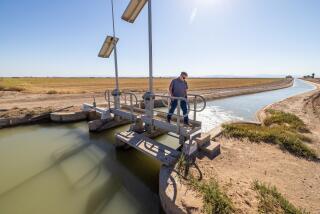Keeping Manure in Its Place
- Share via
In a new campaign to protect the quality of Orange County’s drinking water supply, officials are offering discounts to Inland Empire dairy farmers who compost their cow manure rather than let it run off into the Santa Ana River.
The money-for-manure program is aimed at reducing the amount of salt and nitrates flowing from the river into Orange County’s aquifers, a problem that officials consider a long-term threat to local ground water.
Trout and bass at an Anaheim fishing lake died in record numbers last March because of huge amounts of dairy runoff generated by El Nino storms. The Chino Basin area of Riverside and San Bernardino counties is home to 313,000 cows. They produce about 600,000 tons of manure that washes downstream into Orange County annually, officials said.
The Orange County Water District is offering financial incentives to farmers in an effort to increase the use of a composting plant to dispose of the manure. The district has contributed $175,000 that will be used to subsidize the price farmers pay for composting.
For every wet ton of manure, the composting process will remove an estimated 154 pounds of salt.
The immediate goal is to compost about 150,000 tons of manure by the end of the year and an additional 200,000 tons next year.
“We’ll be going full strength till the end of the year,” said Gary Hackman, manager of processing for the Inland Empire Utilities Agency, which runs the composting facility. “It’s going to be close, but we think we’ll make it.”
The plant, amid the dairy farms in Chino, also processes tons of liquid waste. Discharge of waste water into the Santa Ana River has also concerned Orange County water officials, but less so in recent years with the development of better sewer systems.
Officials at the Milk Producer’s Council, which represents about 120 Inland Empire farmers, said they expect to easily meet the water district’s composting goals.
Response to the project has been enthusiastic, said council executive director Robert Feenstra, and about 30 farmers have already agreed to compost their cow waste.
Dairies average 700 to 800 cows per farm, Feenstra said, and one cow produces about 10 pounds of manure a day, or 1.5 tons a year. Many farmers have stockpiles of manure that they are unable to dispose.
Cropland in Riverside and San Bernardino counties has diminished with increasing development, Feenstra said, reducing the demand for manure-based fertilizers.
“The opportunity given the dairymen by Orange County and the Inland Empire Utilities has been a great help in removing the fertilizer from the dairy operation,” he added. “We’re going to be looking for every opportunity to completely remove all the livestock waste from the Chino Basin.”
Orange County Water District officials see the composting effort as only a short-term solution to the manure runoff problem, said spokesman Ron Wildermuth.
The agency is asking the Environmental Protection Agency and U.S. Agriculture Department to inspect farms this winter to make sure they comply with laws prohibiting farmers from allowing manure to pile up, Wildermuth said.
Officials stress that Orange County’s ground water is now perfectly safe. But they fear water quality could suffer in the future if the manure problem isn’t corrected.
(BEGIN TEXT OF INFOBOX / INFOGRAPHIC)
Nitrate Problem
Runoff from dairies, along with treated waste water from Riverside and other communities, is dumping nitrates into the Santa Ana River. The river, which flows through wetlands, past the Prado Dam and into Anaheim, is a main replenisher of Orange County’s ground water basin, or aquifer. A closer look at the path:
Dairy farms: Highest concentration of dairy cows in the United States
North County ground water wells: High levels of nitrates found; water heavily diluted with nitrate-free water before being introduced into public water system, so tap water contains low levels of nitrates.
Aquifers: River water diverted into holding ponds, where it percolates into aquifer, raising ground water levels.
More to Read
Sign up for Essential California
The most important California stories and recommendations in your inbox every morning.
You may occasionally receive promotional content from the Los Angeles Times.










